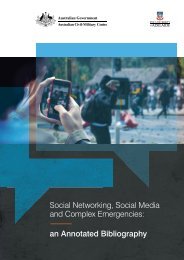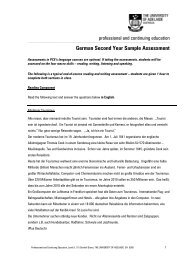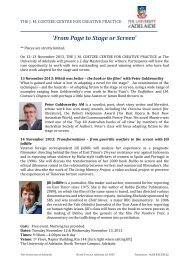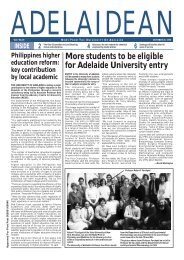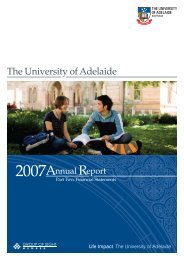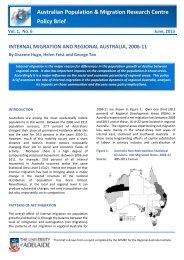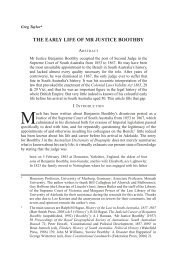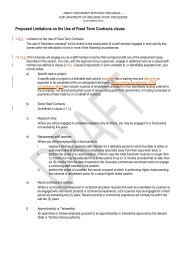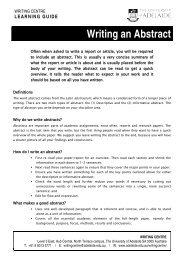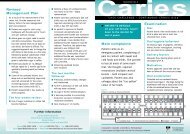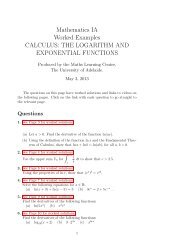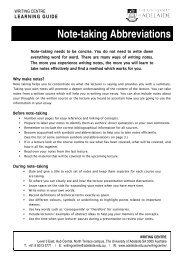Unbridling the Tongues of Women - The University of Adelaide
Unbridling the Tongues of Women - The University of Adelaide
Unbridling the Tongues of Women - The University of Adelaide
Create successful ePaper yourself
Turn your PDF publications into a flip-book with our unique Google optimized e-Paper software.
<strong>Unbridling</strong> <strong>the</strong> tongues <strong>of</strong> women<br />
recalled, ‘that though Australia was to be a great country <strong>the</strong>re was no market for<br />
literary work, and <strong>the</strong> handicap <strong>of</strong> distance from <strong>the</strong> reading world was great’. 34 She<br />
tried to overcome <strong>the</strong> distance by setting long sections <strong>of</strong> Mr Hogarth’s Will and <strong>The</strong><br />
Author’s Daughter in Britain, and most <strong>of</strong> Handfasted in an imaginary hidden valley<br />
in America. She tried to woo <strong>the</strong> colonial market by extending <strong>the</strong> sphere <strong>of</strong> society<br />
she depicted to include a peer <strong>of</strong> <strong>the</strong> realm in <strong>The</strong> Author’s Daughter, and <strong>the</strong> station<br />
hands and a pair <strong>of</strong> dissolute and murderous gentlemen in Ga<strong>the</strong>red In. But she<br />
refused to join those novelists whose work was to become part <strong>of</strong> <strong>the</strong> legend <strong>of</strong> <strong>the</strong><br />
1890s by writing an ‘<strong>of</strong>fensively Australian’ novel. 35 She thought that ‘<strong>the</strong> specialism<br />
which … has invaded fiction’ meant that ‘In modern novels provincialism seems to<br />
have run a little mad’. 36 She considered <strong>the</strong> dominance in Australian writing <strong>of</strong><br />
<strong>the</strong> ‘deadbeat’ – <strong>the</strong> remittance man, <strong>the</strong> gaunt shepherd with his starving<br />
flocks and herds, <strong>the</strong> free selector on an arid patch, <strong>the</strong> drink shanty<br />
where <strong>the</strong> rouseabouts and shearers knock down <strong>the</strong>ir cheques, <strong>the</strong> race<br />
meeting where high and low, rich and poor, are filled with <strong>the</strong> gambler’s<br />
ill luck –<br />
as ‘false in <strong>the</strong> impression <strong>the</strong>y make on <strong>the</strong> outside world and on ourselves’. Better<br />
she believed, ‘to see Australia steadily and see it whole’. 37<br />
That view, expressed in 1902, suggests why Spence’s novels have met treatment<br />
at <strong>the</strong> hands <strong>of</strong> Australia’s men <strong>of</strong> letters as unappreciative as <strong>the</strong>ir treatment by her<br />
publishers. ‘Provincialism’ can be found as readily in relation to <strong>the</strong> separate spheres<br />
<strong>of</strong> women and men as in geographical chauvinism. It is only because, as Simone de<br />
Beauvoir observed, men describe <strong>the</strong> world from <strong>the</strong>ir own point <strong>of</strong> view, which<br />
<strong>the</strong>y confuse with absolute truth, that such provincialism is not recognised more<br />
<strong>of</strong>ten. 38 Novel-writing may have been <strong>the</strong> line <strong>of</strong> least resistance to a woman trying<br />
to make her living, but writing novels that did not depict <strong>the</strong> favoured subjects<br />
brought Spence straight up against a brick wall. When seeking a publisher in Sydney,<br />
she was assured that ‘<strong>the</strong> only novels worth publishing in Australia were sporting or<br />
political novels’. 39 Those to which <strong>the</strong> critics have awarded places in <strong>the</strong> Great Tradition<br />
<strong>of</strong> Australian Fiction were, likewise, those concerned with <strong>the</strong> public sphere and<br />
predominantly masculine adventures and heroics. Read by <strong>the</strong> same people in <strong>the</strong><br />
same way, Spence’s novels could only gain, at best, negative approval. It is striking<br />
that even Sinnett’s enthusiasm is chiefly for what Clara Morison is not, ra<strong>the</strong>r than<br />
for what <strong>the</strong> book does. As Susan Sheridan wrote recently:<br />
48



